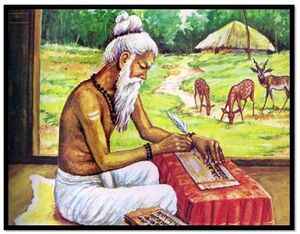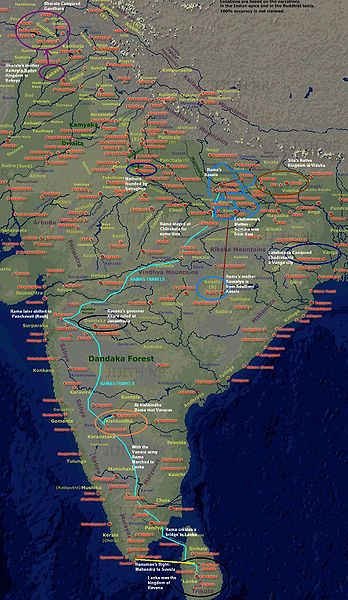Ramayana


Rāmāyaṇa (रामायण) is an ancient Sanskrit epic attributed to the Hindu sage (maharishi) Valmiki and an important part of the Hindu canon (smṛti). It was the original story on which other versions were based such as the Thai Ramakien, the Lao Phra Lak Phra Lam and the Malay Hikayat Seri Rama.
Divisions of Ramayana into Kandas
Valmiki Ramayana has been traditionally divided into seven books known as Kanda, dealing with the life of Rama from his birth to his death.
- 1. Bala Kanda – Book of the Childhood
- 2. Ayodhya Kanda – Book of Ayodhya
- 3. Aranya Kanda – Book of the Forest
- 4. Kishkindha Kanda – Book of Kishkindha
- 5. Sundara Kanda – Book of Auspiciousness
- 6. Yuddha Kanda – Book of the War
- 7. Uttara Kanda – Book of the North
History
The name Rāmāyaṇa is a tatpurusha compound of Rāma and ayana "going, advancing", translating to "Rāma's Journey". The Rāmāyaṇa consists of 24,000 verses in seven books, and 500 cantos (kāṇḍas) [1] and tells the story of Rāma, whose wife Sita is abducted by the demon (Rākshasa) king of Lanka, Rāvana. Thematically, the epic explores themes of human existence and the concept of dharma.[2]
The characters of Rama, Sita, Lakshmana, Bharata, Hanumān and Rāvana (the villain of the piece) are all fundamental to the cultural consciousness of India.
Period of Ramayana
According to literary scholarship, the main body of the Ramayana first appeared as an oral composition somewhere between 750 to 500 BC. Cultural evidence (the presence of sati in the Mahabharata but not in the main body of the Ramayana) suggests that the Ramayana predates the Mahabharata [3] Traditionally the epic belongs to the Treta Yuga, one of the four eons (yuga) of Hindu chronology, and is dated as far back as 880,000 years in the past. [4] Rama is said to have been born in the Treta Yuga to King Daśaratha in ikshuaku vansh (clan) [5]
External links
Foot notes
- ↑ Romesh Dutt, "Epilogue by the Translator", Ramayana, The Epic of Rama, Prince of India, London, J.M. Dent 2nd ed., (1902) p. 183. Dutt cites Ramayana, Book VII, "Uttra-Kinda".
- ↑ Brockington, John (2003), "The Sanskrit Epics", in Flood, Gavin, Blackwell companion to Hinduism, Blackwell Publishing, pp. 116-128, ISBN 0-631-21535-2
- ↑ Goldman, Robert P., The Ramayana of Valmiki: An Epic of Ancient India pp. 23
- ↑ das, Krishna Dharma., The Ramayana pp. 1
- ↑ Indian Wisdom Or Examples of the Religious, Philosophical, And Ethical Doctrines of the Hindus, by Monier Williams, Published 2006
References
- Ramayana of Valmiki(English translation is available at http://www.sacred-texts.com/hin/index.htm)
- Valmiki Ramayana
- Ramayana (Devanagari and IAST romanization)
- Download complete Ramayan of Valmiki translated in English by Ralph T. H. Griffith 1874 in PDF format with footnotes, Table of content and Index
- Valmiki Ramayana translated by Ralph T. H. Griffith (1870-1874)
- Abridged Ramayana and Mahabharata by R.C. Dutt (1899)
- Valmiki Ramayana
Back to Books on Jat History

